
Almost certainly true, whether they or Joe Manchin want it to be true or not. The latest collapse of the improbable negotiations around the fantasy progressive hobby-horse reconciliation bill has soured Manchin’s Senate colleagues on continuing negotiations with the West Virginia Democrat. Even a later attempt yesterday to leave the door open for more talks had Democrats from Biden on down refusing to engage — for now:
A day after pulling the plug on his party’s plans to pass a climate, energy and tax package this summer, Senator Joe Manchin III of West Virginia, the conservative-leaning Democrat who has repeatedly flirted with compromise only to scuttle his party’s highest ambitions, called in on Friday to a West Virginia radio show. Perhaps, he suggested, in another month or so, he might see his way clear to salvaging the last bits of President Biden’s domestic agenda.
There was no guarantee, of course, and the comments were only the latest instance of Mr. Manchin capitalizing on his role as a swing vote in an evenly divided Senate to dictate his party’s legislative strategy, leaving Democrats at his mercy.
This time, Democrats had had enough.
Rather than engage in another round of will-he-or-won’t-he negotiations with Mr. Manchin, Mr. Biden let it be known that he was done trying to secure his climate agenda in Congress.
Mr. Manchin’s abrupt withdrawal left Senator Chuck Schumer, Democrat of New York and the majority leader, jilted after months of courting a colleague whose demands and red lines seemed to shift by the day, or the latest economic projection. And it prodded many Democrats into open revolt against Mr. Manchin, blaming him for the demise of their ambitions and the last chance for their party to tackle the existential threat of climate change.
READ RELATED: NY Times Just Wants You to Know That It's 'Been Hell' for Ray Epps
If this sounds like a temper tantrum, at least it’s a consistent response. Manchin’s fellow Democrats, including Biden, have been demonizing Manchin and Kyrsten Sinema as well for almost a full year over their skepticism over Biden’s economic policies. It turned out that Manchin and Sinema were right, which rather than force a recalculation on the part of Democratic leadership produced an escalation against Manchin especially. And all of this — all of it — could have been avoided by looking at the obvious math of a 50/50 Senate and realizing from the start that Manchin had to be intimately involved in putting together their agenda in order to secure his vote.
Instead, they took Manchin for granted, then tried to steamroll him, then tried to conduct character assassination by calling Manchin a racist not just on reconciliation but also on the Democrats’ radical election-federalizing bill. Only after all of that failed to move Manchin (and Sinema) did Schumer start negotiating in good faith. But by then it was too late — the inflation genie had long been released from the lamp, and Biden’s serial lies and misrepresentations about it didn’t do anything to stuff it back in the bottle.
Even if everyone on that side of the aisle accepted their proper blame for this political fiasco, though, Democrats would still be dunzo with Manchin, not out of choice but out of function. Again, all we have to do is check the math — and the calendar. Even if the Senate remains a 50/50 chamber next year after this Red Tsunami midterm election cycle, the House is clearly going to come back under Republican control. That means nothing passes in Congress without Republican input, not just Manchin’s, which all but makes Manchin an afterthought. Having the 50th vote in a Senate where a reconciliation bill is impossible isn’t much leverage any more.
And if Republicans manage to take back the Senate, Manchin may not be much use to Mitch McConnell either, except as just another potential vote. Joe Biden will still be president, and Biden won’t sign anything passed by a Republican Congress that doesn’t benefit Biden in some way. All of the talks will be between McConnell, Schumer, Kevin McCarthy, and Biden in either configuration, and Manchin won’t be in the mix much at all.
September 30 isn’t just the expiration date on reconciliation. It’s the expiration date on Manchin’s leverage as the 50th Senate Democrat. And that means an end to Manchin’s months at the center of American politics … which might have provided Democrats with a last-gasp ten weeks of leverage left, if they hadn’t been so bound and determined to make Manchin such a public bete noire among progressives.
Source:





